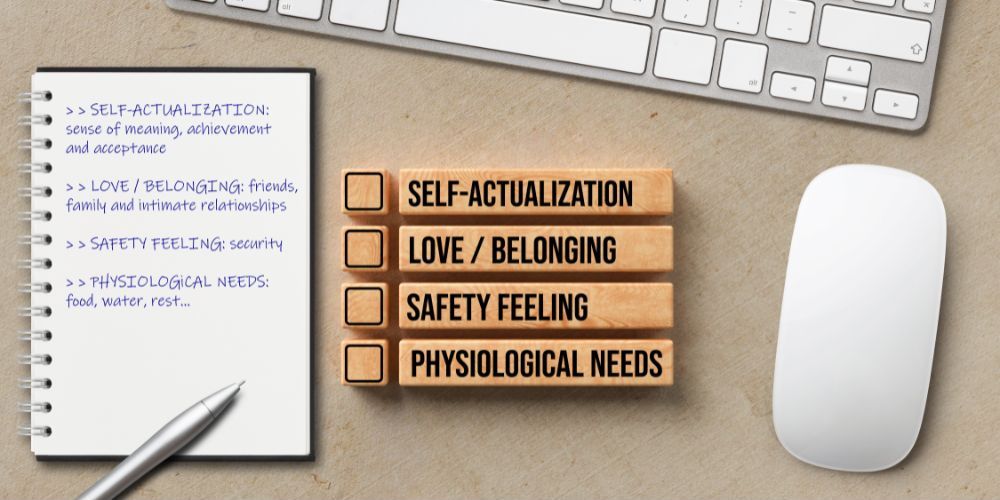Our learning approaches and teaching methods are based on humanistic and constructive philosophies of education, taking inspiration from theorists such as Maslow, Dreikurs, Piaget, and Vygotsky, and are backed by strong evidence from modern meta-analysis studies, including those done by brothers David and Roger Johnson, on the value and success of cooperative learning.
Psychology Frameworks
The hierarchy of needs
Abraham Maslow (1908-1970) created a ‘hierarchy of needs’, a theory of psychological health predicated on fulfilling innate human needs. He suggested that humans will act in ways that will ensure their needs are met in order of importance, with basic needs being addressed as a priority. Assuming basic human needs are met, humans will seek security, belonging, development of esteem, and, finally, self-actualization, or the “realization of one’s potential” and “the full development of one’s abilities and appreciation for life” (Maslow, 1962). However, the state of self-actualization is only obtainable after fundamental needs for survival, safety, love and self-esteem are met. So, a child who is hungry, thirsty, too hot or too cold, cannot focus on learning. Similarly, a child who does not feel safe cannot focus on learning. When children face school attendance barriers or displays distressed behaviour this is often indicative of feeling unsafe. Addressing this need goes beyond keeping a child physically safe, children must feel emotionally safe, through strong, supportive, trusting and mutually respectful relationships, both with the adults supporting them, and their peers.

The roots of misbehaviour
Rudolf Dreikurs (1897-1972) suggested that human “misbehaviour” is the result of feeling a lack of belonging to one’s social group. He described four “mistaken goals” that such children would resort to; when children feel an absence of belonging, they firstly display attention seeking behaviours. If they do not receive the attention they seek, they move onto seeking power. If their power struggle is thwarted, they seek revenge. If even revenge does not achieve the desired response, they begin to feel inadequate, and begin to give up. These “misbehaviours” are considered “challenging” in a mainstream setting when learners cannot cope with behaviourist pedagogical techniques. Socially oriented pedagogical techniques, such as that proposed by Dreikurs, do not consider punishment an effective method of discipline. Dreikurs views punishment as an action taken by the teacher as an act of revenge and to show the students who is in charge. Dreikurs believed in prevention, and his main focus was on constructive behaviour rather than coercive discipline. He recommended that teachers help students gain a sense of belonging and have a shared social interest.
Social Constructivism
Lev Vygotsky (1896-1934) developed ‘Social Constructivism’, a theory that acknowledges that individuals are active participants in the creation of their own knowledge and learning itself is a collaborative process. Vygotsky also presented the idea of ‘Zone of Proximal Development’ (ZPD) which states that when a more knowledgeable person helps a learner develop skills and knowledge by guiding them through tasks they can move beyond their current ability. This is called scaffolding, and as the student becomes more competent, the expert gradually stops helping until the student can perform the skill by themselves. The ‘expert’ can be a teacher, a mentor or a peer. Within a mixed aged peer group there is a variety of knowledge and skills that transcend year group settings, and as such the scaffolding of knowledge and skills can occur between all learners. When coupled with the ‘the protégé effect’, which goes back to the Roman philosopher Seneca, who said, “when we teach, we learn.”, the fullness of learning is utilised as those helping scaffold learning for others develop a richer and deeper understanding of the topics themselves.
In learning methods based on constructivist theories the learner plays the role of the constructor of information and takes an active role in developing their own lines of enquiry. In meta-analysis of over 200 studies, Johnson, et al. (1998), Kuh, et al (2007) and Springer, et al. (1999), found that cooperative learning improves academic performance compared to competitive learning and individualistic learning, and that cooperative learning improves self-esteem and persistence, increases both positive attitudes about learning and student engagement.


